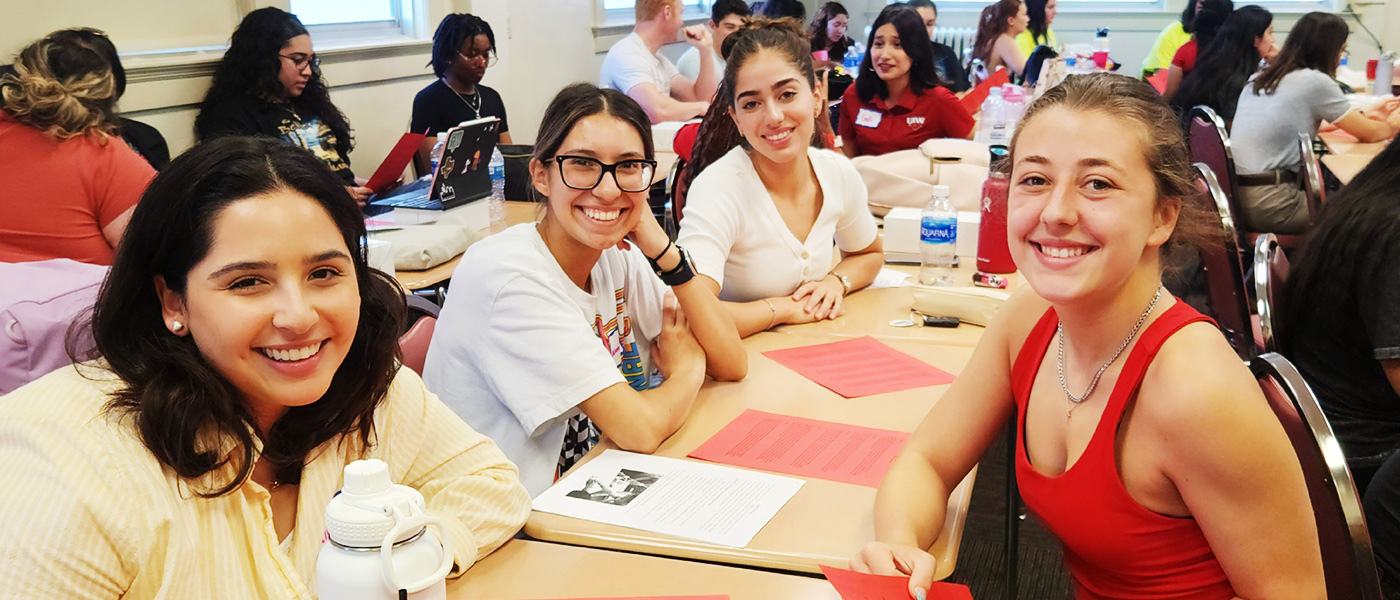By David Castillo
You can’t miss them. If you’re walking across the UIW Broadway campus, a new symbol adorns the halls and offices of over 100 faculty and administrators. Whether it’s in the Student Engagement Center, Columkille Administration Building, Athletics support offices or the University’s various academic buildings, the symbol reminds students of the many people on campus supporting their pathway through a new mentoring program called FLIGHT.
“The FLIGHT program, funded by a five-year, $2.9 million Title V federal grant, is establishing a multi-pronged, campuswide initiative that trains select faculty, administrators and students as mentors,” explains FLIGHT Project Director Sandra McMakin.
FLIGHT, an acronym for Financial Literacy, Integrated Guidance, and health career tracts, supports the President’s strategic initiative to establish a mentor program to help guide students on their path to graduation. To earn FLIGHT plates, mentors complete a training series designed by the Faculty Advisory Board (FAB) on thinking critically about the UIW Mission, financial literacy, student success, student wellness, and how mentoring can empower students to build networks for themselves and increasingly identify as future leaders.
Dr. Tanja Stampfl, chair of English and the FAB, stresses that FLIGHT is about organic mentoring and creating mentor moments, rather than formal networking. “With FLIGHT, I aim to support students individually in mentoring moments as they arise, systematically by identifying larger processes or problems that can be addressed, and programmatically by training and supporting FLIGHT mentors across the University so that every UIW student has the opportunity to be mentored.”
Once certified, mentors receive their FLIGHT plate, with the very meaningful symbol, further spreading the word to students that mentors are around every corner. UIW Graphic Design student Fiona Swisher, who designed the FLIGHT symbol explains the design, “Hands are nurturing a cardinal about to take flight. These hands represent the FLIGHT mentors while the cardinal taking flight represents the student.” Training FLIGHT mentors to address the needs of the individual student may help to reassure students that they belong at UIW. To transform the student experience, FLIGHT’s presence is embedded across multiple activities funded by the grant. Activity 1 is the FLIGHT Virtual Mentor Center on social media, and on various UIW learning platforms. This virtual center, managed by Dr. Deborah Quiñones, is an interactive resource center for connecting students to faculty and administrators as well as mentors to each other.
Quiñones shared, “Empowering FLIGHT mentors, with knowledge and resources, to support our students through their academic journey and on to graduation is our goal.”
In the near future, the virtual FLIGHT Center will add a physical space to enhance the development of successful mentoring moments on campus.
Activity 2 is a first-year engagement seminar (FYES) course, taught by FLIGHT-certified mentors, with FLIGHT-certified peer mentors embedded in the course. FYES empowers firstyear students to navigate their academic journeys by becoming involved and engaged, and begin career exploration so they are prepared for life after graduation.
Dr. Emily Clark, FYES coordinator and FAB member, affirms the impact of the course for our students, “I think one of the most powerful things about FYES is that it creates an indelible sense of belonging for our first-year students, not just as students but as people, which is really at the heart of the Mission.”
In addition to the Mentor Center and the FYES course, the FLIGHT Program also includes Activity 3. The third activity focuses on mentoring UIW students who are planning to pursue a professional health program. FLIGHT Health Advisor and Mentor, Dr. Roxanna Nelson is currently working with over 500 prehealth students to develop and monitor a pathway to their desired graduate health professions program.
“The FLIGHT program has provided our pre-health professions students with additional guidance as well as the opportunity to develop a customized plan for their pathway leading to successful admittance and completion of a health professions program,” explains Dr. Rachell Booth, chair of the FLIGHT Health Professions Advisory Council (HPAC). The HPAC is comprised of faculty and administrators who guide the design of the pathway and review resources for the pre-health students.
These multiple activities support the FLIGHT design of a network of mentors, contributing diverse skills and varied backgrounds to assist UIW students at multiple stages of the college experience. The goal is that every UIW student can meet at least one and hopefully multiple mentors on their pathway to graduation. Stampfl emphasizes that the FLIGHT program “aligns with the Mission of the University, where we come together as One Word.”



